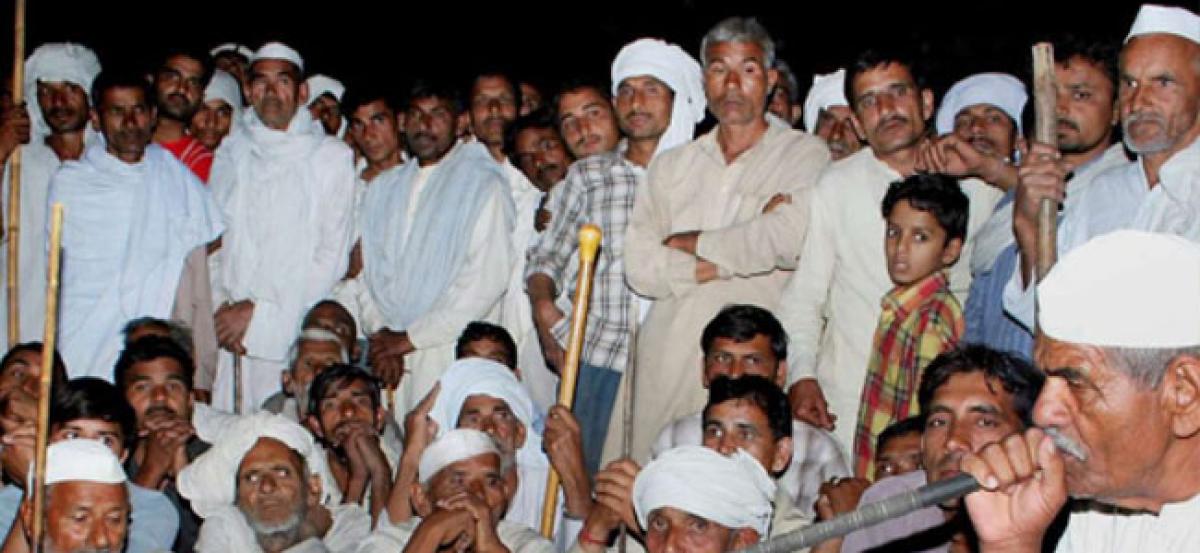Live
- First Impressions and Unboxing of the MacBook Pro M4: A Powerhouse for Professionals and Creators
- China Gears Up for Potential Trade War Amid Trump’s Tariff Threats
- Small Farmers Gain Less by Selling to Supermarkets: Study Reveals
- Why Despite the Controversy, America Is Anticipating the Mike Tyson vs. Jake Paul Fight
- Sanju Samson and Tilak Varma Shine: Record-Breaking Feats in 4th T20I Against South Africa
- India Urges $1.3 Trillion Annual Climate Support for Developing Nations
- Bad air: 106 shuttle buses, 60 extra Metro trips planned to make Delhiites give up cars
- WHO reports declining monkeypox cases in Congo
- CM Attends Kotideepotsavam on Kartika Purnima
- PKL Season 11: Raiding trio of Devank, Ayan, Sandeep help Patna Pirates rout Bengal Warriorz
Just In

In a relief to inter-faith or inter-caste couples who often face threat to their lives due to their relationship, the Supreme Court today banned any interference by illegal assemblies like \'khap panchayats\' into their marriages, terming the intrusions as \"absolutely illegal.\"
In a relief to inter-faith or inter-caste couples who often face threat to their lives due to their relationship, the Supreme Court today banned any interference by illegal assemblies like 'khap panchayats' into their marriages, terming the intrusions as "absolutely illegal."
A bench of Chief Justice Dipak Misra and justices AM Khanwilkar and D Y Chandrachud also laid down guidelines to prevent such interferences and said the norms laid down by it would remain in force till a suitable legislation is enacted by the Parliament. The ruling came on a plea by NGO Shakti Vahini, which had moved the apex court in 2010 seeking protection of couples from honour killings.
While reserving its verdict in March this year, the court had observed that when two consenting adults get married irrespective of their background, no relative or a third person can interfere or threaten or unleash violence against them. During the proceedings in the matter, the Centre too had told the top court that state governments must provide protection to couples fearing for their lives due to inter-caste or inter-faith marriages and that such couples should inform the marriage officers about any such threat so that they can be given protection.
In an indication that it would not recognise 'khap panchayats', the top court had also said that it would refer to them only as an assembly of persons or as a community group. The apex court had earlier said incidents of attacks against those going for inter-caste or inter-faith marriages were "absolutely illegal" and no 'khap panchayat, individual or the society could question any adult woman or man marrying to a person of his or her choice.
'Khap' panchayats are caste or community groups, present largely in rural areas of north India which at times act as quasi-judicial bodies and pronounce harsh punishments based on age-old customs. Several cases of women and men falling victim to 'khap' diktats have been reported over the years, particularly in states like Haryana, Uttar Pradesh and Rajasthan.
The apex court had also asked khap panchayats not to behave like "conscience keepers of the society" and said that a marriage between two adults was governed by the law. 'Khap panchayats' had earlier told the court that they were encouraging inter-caste and inter-faith marriages and had referred to provisions of the Hindu Marriage Act which prohibit a union between 'sapinda' relationships or close blood relatives among Hindus.
They had claimed that they were performing their duties as conscience keepers of the society. The court had invited 'khap panchayats' to hear their views before issuing an order to stop them from harassing or killing couples purportedly to protect the honour of a family, caste, community or faith.
The Centre had earlier pleaded with the apex court to put in place a mechanism to monitor crimes against women by khap panchayats, saying that the police was not able to protect such women.The top court had also said that as a pilot project, it would examine the situation in three districts of Haryana and Uttar Pradesh where khap panchayats were active.
In 2007, a Haryana court had awarded death to five people and sentenced one person to life for killing a couple on the orders of a self-styled 'khap panchayat' for marrying against societal norms.
In April 2015, the khap of Notara Bhopat village had ordered a woman from Rajasthan to live with a man whose wife had eloped with her husband. In 2014, a community panchayat in Uttar Pradesh had banned girls from wearing jeans and keeping mobile phones, claiming that these had a "bad" effect on them and were responsible for sexual harassment incidents.

© 2024 Hyderabad Media House Limited/The Hans India. All rights reserved. Powered by hocalwire.com







